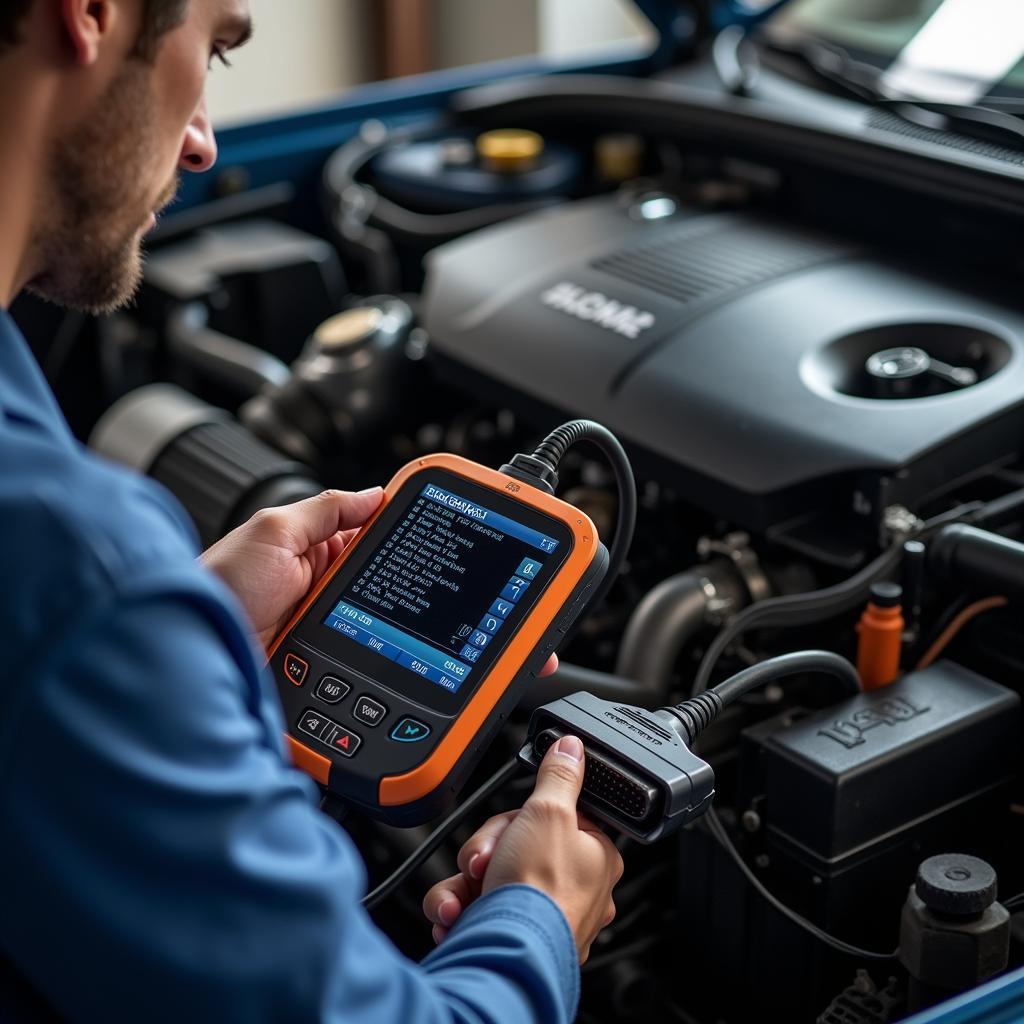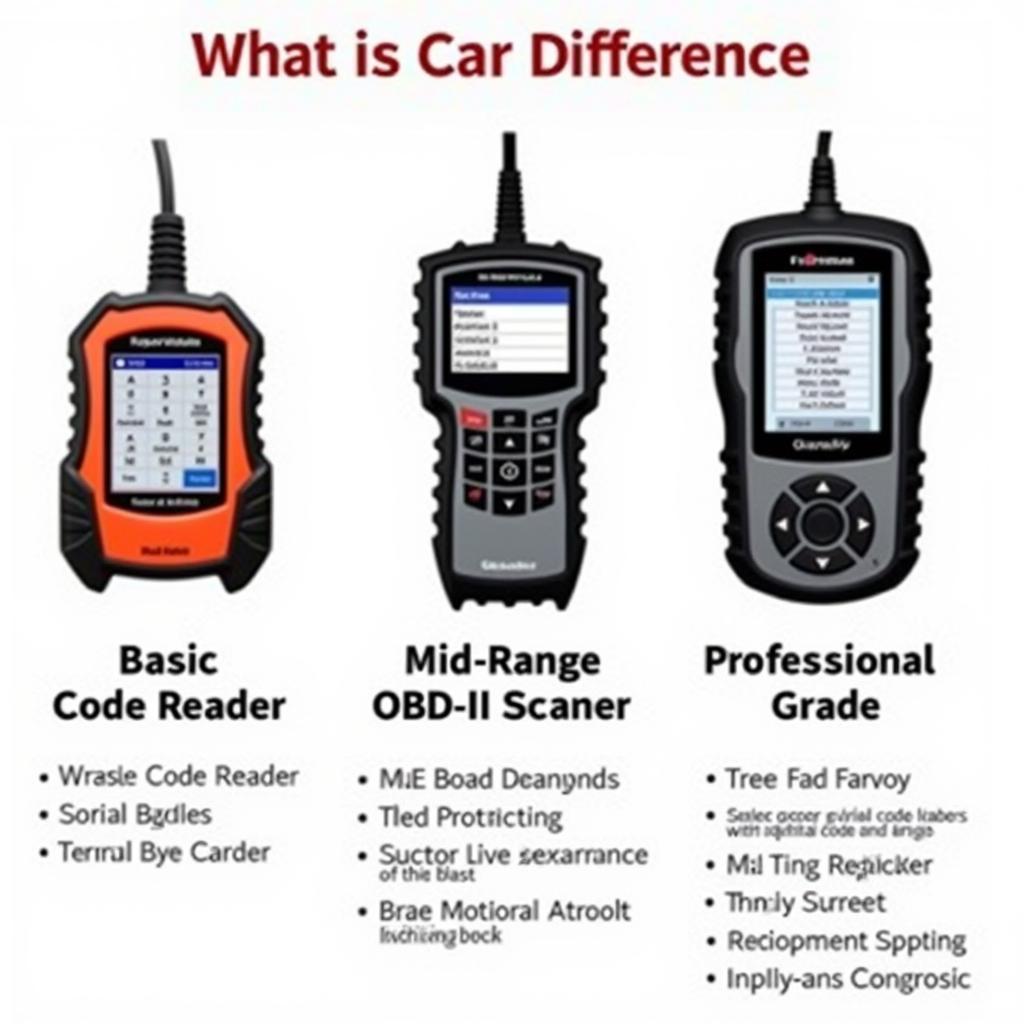Finding the right car diagnostic scanner can feel like searching for a needle in a haystack, especially with the sheer volume of options available today. Whether you’re a seasoned mechanic or a car enthusiast looking to DIY, having the best car diagnostic scanner for your needs is crucial. This comprehensive guide will delve into the world of car diagnostic scanners, helping you understand their functionalities, benefits, and the key factors to consider before making a purchase.
Why You Need a Car Diagnostic Scanner
Modern vehicles are becoming increasingly complex, relying heavily on intricate computer systems. When a problem arises, the days of relying solely on mechanical expertise are fading. This is where car diagnostic scanners come into play. These sophisticated devices act as a bridge between your car’s computer and you, translating complex error codes into understandable information.
But the benefits extend beyond just reading error codes:
- Pinpoint Problems Quickly: Instead of spending hours visually inspecting components, a car diagnostic scanner can identify the root cause of a problem within minutes, saving you valuable time and effort.
- Prevent Costly Repairs: By detecting issues early on, you can address them before they escalate into major (and expensive) repairs.
- Enhanced DIY Capabilities: Car diagnostic scanners empower car owners to take control of their vehicle maintenance, allowing for simple DIY fixes and informed decisions about professional repairs.
- Improved Resale Value: A well-maintained vehicle, backed by diagnostic reports, holds a higher resale value.
 Mechanic using the best car diagnostic scanner to diagnose engine problems
Mechanic using the best car diagnostic scanner to diagnose engine problems
Types of Car Diagnostic Scanners
Choosing the right car diagnostic scanner depends largely on your specific needs and budget. Here are the most common types:
1. Code Readers
As the name suggests, code readers primarily read and clear basic diagnostic trouble codes (DTCs). They are the most affordable option and are suitable for car owners who want to understand why their check engine light is on.
2. OBD-II Scanners
OBD-II scanners are a step up from code readers, offering more advanced functionalities like viewing live data streams, freeze frame data, and oxygen sensor readings. These scanners are ideal for DIYers who perform regular maintenance and troubleshooting.
3. Professional-Grade Scanners
Professional-grade scanners are the most comprehensive and expensive option, designed for professional mechanics and workshops. They offer a wide range of advanced features, including bi-directional control, programming capabilities, and access to manufacturer-specific codes.
 A comparison of OBD-II code readers, scanners, and professional-grade diagnostic tools
A comparison of OBD-II code readers, scanners, and professional-grade diagnostic tools
Factors to Consider When Choosing a Car Diagnostic Scanner
Before investing in a car diagnostic scanner, consider these essential factors:
1. Vehicle Compatibility
Ensure the scanner you choose is compatible with your vehicle’s make, model, and year. While most scanners support the standard OBD-II protocol, some vehicles might require manufacturer-specific tools.
2. Features and Functionalities
Determine the specific features you need based on your skill level and intended use. Do you need basic code reading or more advanced functions like live data streaming and bi-directional control?
3. User Interface and Software
Look for a scanner with an intuitive user interface and user-friendly software. Consider factors like screen size, readability, and ease of navigation.
4. Updates and Support
Choose a scanner that offers regular software updates to ensure compatibility with the latest vehicle models and diagnostic protocols. Check for manufacturer support and warranty information.
5. Budget
Car diagnostic scanners range in price from affordable code readers to expensive professional-grade tools. Set a budget beforehand and prioritize the features that are most important to you.
Conclusion
Investing in the Best Car Diagnostic Scanners can be a game-changer for both car owners and professionals. These tools empower you with the knowledge and capabilities to diagnose car problems accurately, save money on unnecessary repairs, and take control of your vehicle’s maintenance. By carefully considering the factors outlined in this guide, you can choose the perfect car diagnostic scanner to meet your specific needs and budget.
FAQs
1. What is the difference between a code reader and an OBD-II scanner?
A code reader simply reads and clears basic DTCs, while an OBD-II scanner offers additional features like live data streaming and freeze frame data.
2. Do I need a professional-grade scanner for DIY car repairs?
Not necessarily. For basic DIY maintenance and troubleshooting, an OBD-II scanner is usually sufficient. Professional-grade scanners are more suitable for experienced mechanics.
3. Can a car diagnostic scanner fix car problems?
No, a car diagnostic scanner is primarily a diagnostic tool. It identifies the problem, but you’ll need to perform the actual repairs.
4. Are car diagnostic scanners compatible with all car models?
Most scanners support the standard OBD-II protocol, but some vehicles might require manufacturer-specific tools.
5. How often should I use a car diagnostic scanner?
It’s recommended to use a car diagnostic scanner whenever your check engine light comes on or if you experience any performance issues with your vehicle.
Need further assistance?
Contact us via WhatsApp: +1(641)206-8880 or Email: [email protected]. We have a dedicated customer support team available 24/7 to answer all your car diagnostic needs.

Leave a Reply